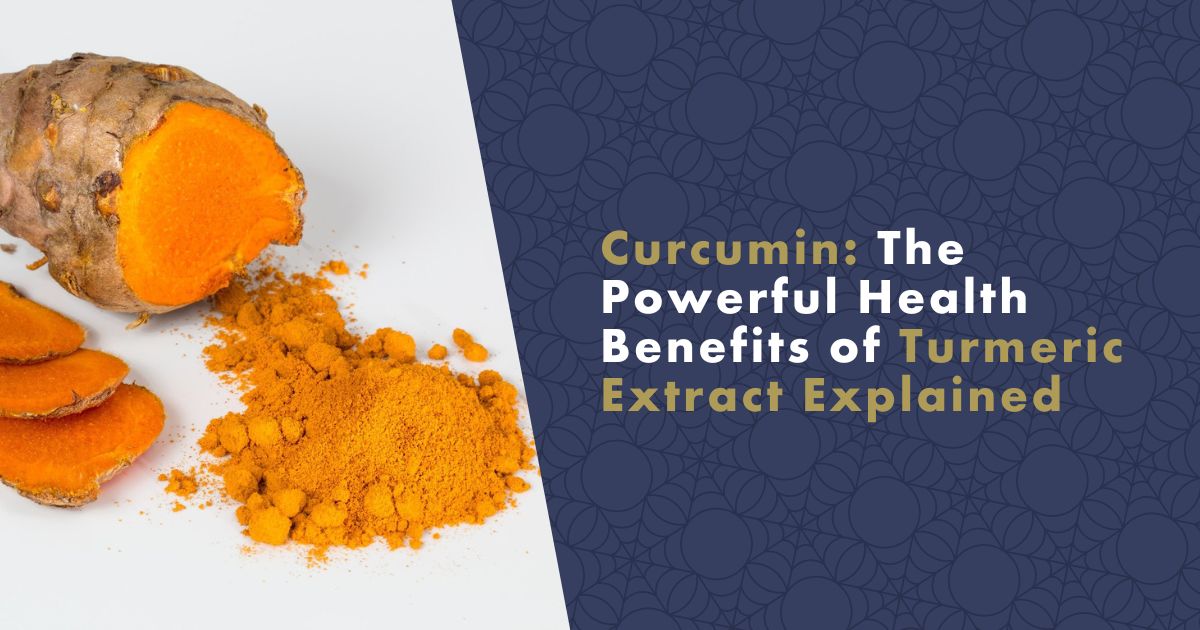Curcumin, a bioactive compound found in turmeric, has gained immense attention for its diverse array of health benefits. In this article, we delve into the remarkable properties of curcumin, exploring the many advantages it offers. From its role in promoting overall well-being to its potential effects as a supplement, we'll uncover the extensive health benefits associated with curcumin extract. Whether you're familiar with curcumin or just starting to explore its potential, this comprehensive guide will provide insights into the wonders of this powerful compound.

What is Curcumin?
Curcumin is one of the main active compounds found in the rhizomes of turmeric (Curcuma longa), a plant native to Asia and closely related to ginger. Turmeric extract is a yellow to orange substance that has been used in traditional medicine for thousands of years. It also has applications in cosmetics and is a key ingredient in curry spice blends.
The medicinal effects attributed to curcumin have been the subject of intensive scientific research. Chemically, it belongs to a group called polyphenols, which are highly soluble in fats and oils.
The Health Benefits of Curcumin and Turmeric
Recent studies have revealed the significant antioxidant properties of curcumin. It helps to suppress free radicals, highly reactive oxygen particles that can damage cell membranes, proteins, and DNA. This process triggers apoptosis, which is the self-destruction of cells. One of its main roles is to protect the body against the development of tumors that can arise from genetic damage.
When free radicals accumulate in the body, often due to environmental pollution, poor diet, or excessive stress, they can lead to chronic inflammation. Research indicates that chronic inflammation contributes to the development of conditions such as heart disease, cancer, Alzheimer's disease, and metabolic syndrome, which includes disorders that can lead to diabetes.
Tip: Read our article on "How to Relieve Stress?"
Curcumin's antioxidant effects are also linked to its anti-inflammatory properties. This can be particularly beneficial for patients with arthritis, a condition characterized by joint inflammation, pain, and limited mobility. Studies conducted between 2010 and 2014 showed that curcumin supplementation reduced inflammation and pain in arthritis patients, while the placebo groups experienced less relief.
Scientists have also explored the preventive effects of curcumin against tumor growth. Experimental evidence suggests that this compound has the potential to eliminate cancer cells and reduce the spread of metastases. However, it's important to interpret these findings with caution as they apply to very high doses of curcumin and specific types of cancer.
A study published in the scientific journal Phytotherapy Research in 2014 further highlighted the antidepressant effects of curcumin, which were found to be comparable to the drug Prozac. Additionally, the study revealed that turmeric extract enhances the effectiveness of Prozac by up to 20%.
How to Consume Curcumin?
The benefits of natural turmeric extract for human health have long been a subject of speculation. In its natural form, turmeric:
- Is poorly absorbed by the body,
- Breaks down quickly,
- Is rapidly eliminated.
However, advancements in pharmacology and nanotechnology have led to the development of curcumin formulations that overcome these limitations and allow for the desired therapeutic effects. To achieve these effects, it is necessary to consume curcumin in the form of dietary supplements that contain modified curcumin.
The presence of piperine, an extract from black pepper, can increase the body's utilization of curcumin by up to 20 times. Further improvement in absorption is achieved through submicronization, which enhances the bioavailability of turmeric extract by 200 times. One such formulation is Neo Curcumin supplement ODT, containing curcumin, piperine, lecithin, and vitamin D3. This formulation ensures rapid absorption in the mouth and throat, leading to quicker effectiveness.
Turmeric extract is also a part of Uro Help Forte, a preparation designed to help alleviate urological issues.
Curcumin Extract and Pets
Curcumin (in the form of nano particles) is also administered to dogs and cats for its beneficial effects on their immune system and joint health. Several studies have demonstrated its effectiveness in strengthening immunity and promoting joint cartilage in domestic animals.

The tablets for pets contain flavorings to make them more palatable and ensure that dogs and cats willingly consume them.
- MiniTabs Immunity Dog – Supports immune function in dogs.
- MiniTabs Joints Dog – Promotes joint regeneration and growth in dogs.
- MiniTabs Immunity Cat – Boosts immunity in cats.
- MiniTabs Joints Cat – Supports joint regeneration and growth in cats.
Undesirable Effects and Contraindications of Curcumin
According to studies conducted by the U.S. Food and Drug Administration (FDA), curcumin is considered safe for the human body even at doses of up to 8 grams per day. The amounts of curcumin in dietary supplements are significantly lower. However, some individuals taking higher doses may experience stomach discomfort, diarrhea, or skin rashes.
Do not take curcumin supplements if you are on blood-thinning medications or have type 1 or type 2 diabetes. The same applies to administering curcumin extract to your pets if they have these health conditions.
Key Takeaways from the Article
- Curcumin is the main active compound derived from turmeric.
- It is characterized by its yellow color and exotic, spicy taste.
- Due to its antioxidant and anti-inflammatory effects, curcumin is sometimes used to alleviate pain in arthritis.
- Research suggests the potential of curcumin in treating depression and inhibiting tumor growth.
- Natural curcumin is poorly absorbed by the body, making it necessary to consume it in modified forms such as dietary supplements.
- Avoid curcumin if you have diabetes (type 1 or type 2) or are taking blood-thinning medications.
Sources:
- Hewlings, S.J. and Kalman, D.S., 2017. Curcumin: A review of its effects on human health. Foods, 6(10), p.92.
- Epstein, J., Sanderson, I.R. and MacDonald, T.T., 2010. Curcumin as a therapeutic agent: the evidence from in vitro, animal and human studies. British journal of nutrition, 103(11), pp.1545-1557.
- Azhdari, M., Karandish, M., and Mansoori, A., 2019. Metabolic benefits of curcumin supplementation in patients with metabolic syndrome: a systematic review and meta-analysis of randomized controlled trials. Phytotherapy research, 33(5), pp.1289-1301.
- Kamal, D.A.M., Salamt, N., Yusuf, A.N.M., Kashim, M.I.A.M., and Mokhtar, M.H., 2021. Potential health benefits of curcumin on female reproductive disorders: A review. Nutrients, 13(9), p.3126.
- Curcumin and resveratrol reduce lipopolysacharide mediated glycosaminoglycan release in an explant model of canine articular cartilage.
- Kocaadam, B. and Şanlier, N., 2017. Curcumin, an active component of turmeric (Curcuma longa), and its effects on health. Critical reviews in food science and nutrition, 57(13), pp.2889-2895.

